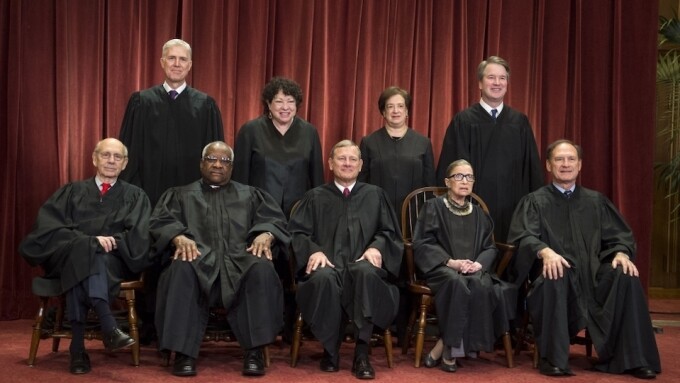WASHINGTON — The U.S. Supreme Court ruled today 8-1 against a “sweeping rule” established by the United States Patent and Trademark Office (USPTO) that the combination of a generic word and '.com' is also generic and therefore not subject to federal trademark protection.
Today’s SCOTUS decision, in an opinion by Justice Ruth Bader Ginsburg, ruled that although the generic word “Booking” could not receive trademark protection, reservations website company Booking.com can create a federally protected trademark.
Until today, the USPTO’s rule did not allow the registration of a generic word plus top-level domain combinations (like “.com”) as a trademark. The rule was based on an 1888 precedent that established that a generic word plus “Inc.” or “Company” could not be trademarked.
Justice Ginsburg was joined by Chief Justice Roberts and Justices Thomas, Alito, Sotomayor, Kagan, Gorsuch and Kavanaugh, with Justice Sotomayor filing a concurring opinion. Justice Breyer was the only dissent.
In her opinion, Ginsburg parsed the meaning of “primary significance” of a trademark arguing that “Booking.com” is not generic because the general public does not think of “Booking.com” (as opposed to just “booking”) as a service they can obtain from a competitor.
According to Ginsburg, “because ‘Booking.com’ is not a generic name to consumers, it is not generic.”
A Trademark Registration Rush
The ruling is narrow, applying specifically to the USPTO’s rule, and does not extend to automatically allowing generic words plus .com to be trademarked. Companies will still have to show that consumers consider the name to be specific to the company and not generic.
Nevertheless, the ruling will likely encourage all kinds of companies — including many in the adult sector — to rush to trademark already-active domain names based on generic words.
“This decision has opened the door to trademark registration for companies that use a generic term as their brand name and domain name,” industry attorney Lawrence Walters, from the Walters Law Group, told XBIZ.
Walters explained that “ordinarily, generic terms cannot be registered as trademarks since that would grant a monopoly to the registrant and prevent other companies from accurately describing their services without infringing on the mark.”
The USPTO, Walters added, has “frequently rejected arguments that a .com or other top-level domains combined with a generic term can create secondary meaning sufficient to allow registration. But the Court has now ruled that these brands are fair game for registration so long as they have developed secondary meaning in the relevant public marketplace.”
The issue of “secondary meaning,” Walters opined, will be crucial to the viability of these registrations.
“Secondary meaning,” Walters told XBIZ, “can be established in several ways, including prior registrations, five or more years of continuous use, or actual evidence that the public associates the brand with a specific company’s goods or services.”
“Both mainstream and adult companies can benefit from this ruling and [should] consider seeking registration for generic brands whose domain names have become synonymous with their products or services,” Walters concluded.








